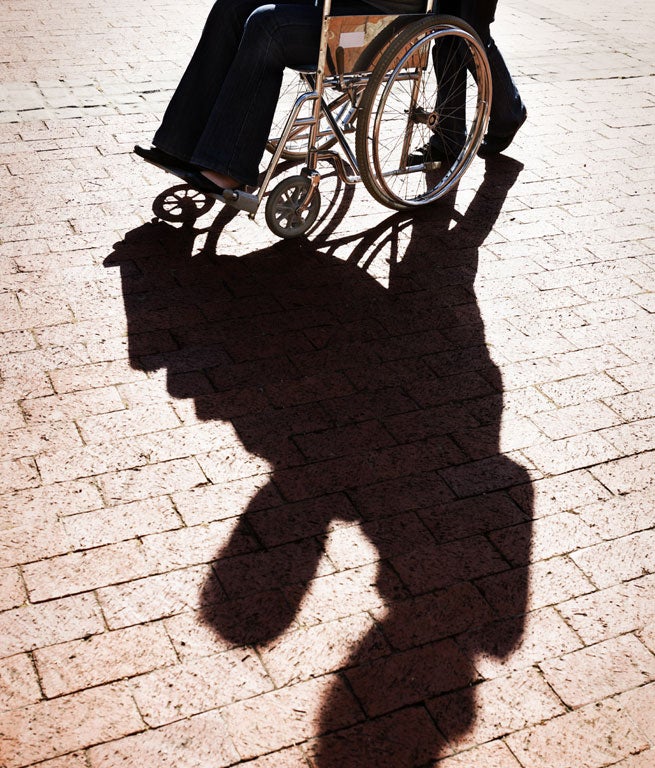Fear of fitness to work tests driving disabled patients to suicide, say 6% of GPs
Survey also found that one in five GPs had at least one disabled patient who had thought about suicide because of the test

Your support helps us to tell the story
From reproductive rights to climate change to Big Tech, The Independent is on the ground when the story is developing. Whether it's investigating the financials of Elon Musk's pro-Trump PAC or producing our latest documentary, 'The A Word', which shines a light on the American women fighting for reproductive rights, we know how important it is to parse out the facts from the messaging.
At such a critical moment in US history, we need reporters on the ground. Your donation allows us to keep sending journalists to speak to both sides of the story.
The Independent is trusted by Americans across the entire political spectrum. And unlike many other quality news outlets, we choose not to lock Americans out of our reporting and analysis with paywalls. We believe quality journalism should be available to everyone, paid for by those who can afford it.
Your support makes all the difference.Six per cent of doctors have experienced a patient who has attempted - or committed - suicide as a result of “undergoing, or fear of undergoing” the Government's fitness to work test.
A survey of over of 1,000 GPs across the UK by ICM also found that one in five had at least one disabled patient who had thought about suicide because of the test, which is aimed at assessing whether people claiming incapacity benefit are fit to work.
The survey, highlighted by Exaro, the investigative website, also found 14 per cent had patients who had self-harmed as a result of the test.
The charity, Rethink Mental Illness, which commissioned the poll, said it showed that the work-capability assessments were pushing some of the most unwell and vulnerable people in society “to the edge”.
Paul Jenkins, the charity's chief executive said: “Many people who have a severe mental illness such as schizophrenia or bi-polar disorder say that their condition has been exacerbated as a result of the stress caused by the test.”
After the Coalition took office in 2010, George Osborne, the chancellor, set out plans for £18 billion in welfare savings by 2014-15.
Ministers argue that the welfare bill can be cut because many people claiming incapacity benefit are well enough to work.
The previous Labour government introduced the test for incapacity benefit - but for new claimants only - in 2008.
In 2011 the Government ordered that everyone on the benefit, some two million people, should be assessed.
But the survey of GPs reveals disturbing evidence of the psychological damage that can be inflicted on those targeted.
The survey found eight out of ten GPs have patients who have developed mental-health problems since the tests were rolled out to everyone claiming incapacity benefit.
They included people who were already suffering from depression, but whose condition was made worse by the prospect of tests, and those with a physical handicap but no history of mental illness.
Claimants feared that their benefits would be cut, and that they would not be well enough to withstand employment.
If they found themselves out of work, they would still be eligible for the job seekers allowance. But this is worth less than employment and support allowance (ESA), which is replacing incapacity benefit.
For new claimants, ESA was introduced in 2008 and will eventually replace incapacity benefit following the re-assessment programme.
The survey cites the case of Ursula Sinclair, 42, from Gloucester. She suffers from depression. Just days after going through the assessment, she attempted to take her own life.
Sinclair said: “I was devastated when I was initially told that I did not qualify for ESA because I know that I am not fit for work at all. I became extremely distressed.”
Tom Greatrex, a frontbench Labour MP who campaigns in Parliament on mental-health issues, told Exaro: “There is clearly a problem when an assessment that is designed to help people back into work ends up having the opposite effect.
“Ministers need to reform the test urgently so that those who can work are supported to do so, but those not healthy enough to work are helped, not hounded.”
The Department for Work and Pensions said that it constantly reviewed the scheme to seek improvements.
Join our commenting forum
Join thought-provoking conversations, follow other Independent readers and see their replies
Comments